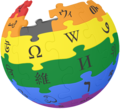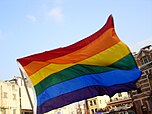Portal:LGBTQ
| Main page | WikiProjects & Things you can do |

|
The LGBTQ+ Portal |

|

|

|
Introduction LGBTQ (also commonly seen as LGBT, LGBT+, LGBTQ+, and LGBTQIA+) is an initialism for lesbian, gay, bisexual, transgender and queer or questioning. It is an umbrella term, broadly referring to all sexualities, romantic orientations, and gender identities which are not heterosexual or cisgender. In the 1990s, gay, lesbian, and bisexual activists adopted the term LGB, supplanting narrower terms such as "gay or lesbian". Terminology eventually shifted to LGBT, as transgender people became more accepted within the movement. Around that time, some activists began to reclaim the term queer, seeing it as a more radical and inclusive umbrella term, though others reject it, due to its history as a pejorative. In recognition of this, the 2010s saw the adoption of LGBTQ, and other more inclusive variants. Some versions of the term, such as LGBT+ and LGBTQ+ add a plus sign, to represent additional identities not captured within the acronym. Many further variants exist which add additional identities, such as LGBTQIA+ (for intersex, asexual, aromantic, and agender) and 2SLGBTQ+ (for two-spirit), LGBTQQ (for queer and questioning), or which order the letters differently, as in GLBT and GLBTQ. The collective of all LGBTQ people is often called the LGBTQ community. These labels are not universally agreed upon by everyone that they are intended to include. For example, some intersex people prefer to be included in this grouping, while others do not. Various alternative umbrella terms exist across various cultures, including queer, same gender loving (SGL), Gender, Sexual and Romantic Minorities (GSRM). (Full article...) Selected article - The rainbow flag or pride flag (also common known as LGBT flag, LGBT+ flag, LGBTQ flag, LGBTQ+ flag, LGBTQIA flag, LGBTQIA+ flag and formerly gay pride flag) is a symbol of LGBTQ pride and LGBTQ social movements. The colors reflect the diversity of the LGBTQ community and the spectrum of human sexuality and gender. Using a rainbow flag as a symbol of LGBTQ pride began in San Francisco, California, but eventually became common at LGBTQ rights events worldwide. Originally devised by the artists Gilbert Baker, Lynn Segerblom, James McNamara and other activists, the design underwent several revisions after its debut in 1978, and continues to inspire variations. Although Baker's original rainbow flag had eight colors, from 1979 to the present day the most common variant consists of six stripes: red, orange, yellow, green, blue, and violet. The flag is typically displayed horizontally, with the red stripe on top, as it would be in a natural rainbow. (Full article...) Selected biography -Leisha Hailey is an American actress and musician known for playing Alice Pieszecki in the Showtime Networks series The L Word and The L Word: Generation Q. Hailey first came to the public's attention as a musician in the pop duo The Murmurs and has continued her music career as part of the band Uh Huh Her. Currently, Hailey appears as Alice in The L Word: Generation Q and hosts podcast PANTS with fellow L Word star and close friend, Kate Moennig. (Full article...) Selected quote -
—"Dear Abby" (Abigail Van Buren) responding to a reader's letter about a gay couple moving across the street; asking how he could improve his neighborhood
Current events
Selected image - 14 May 1928 issue of German lesbian periodical Die Freundin ("Girlfriend")
Did you know… -
This month's birthdays
Selected listsRelated portalsFeatured contentThe following articles and lists have been identified as some of the best produced by the Wikipedia community:
TopicsCategoriesAssociated WikimediaThe following Wikimedia Foundation sister projects provide more on this subject:
Discover Wikipedia using portals |
























